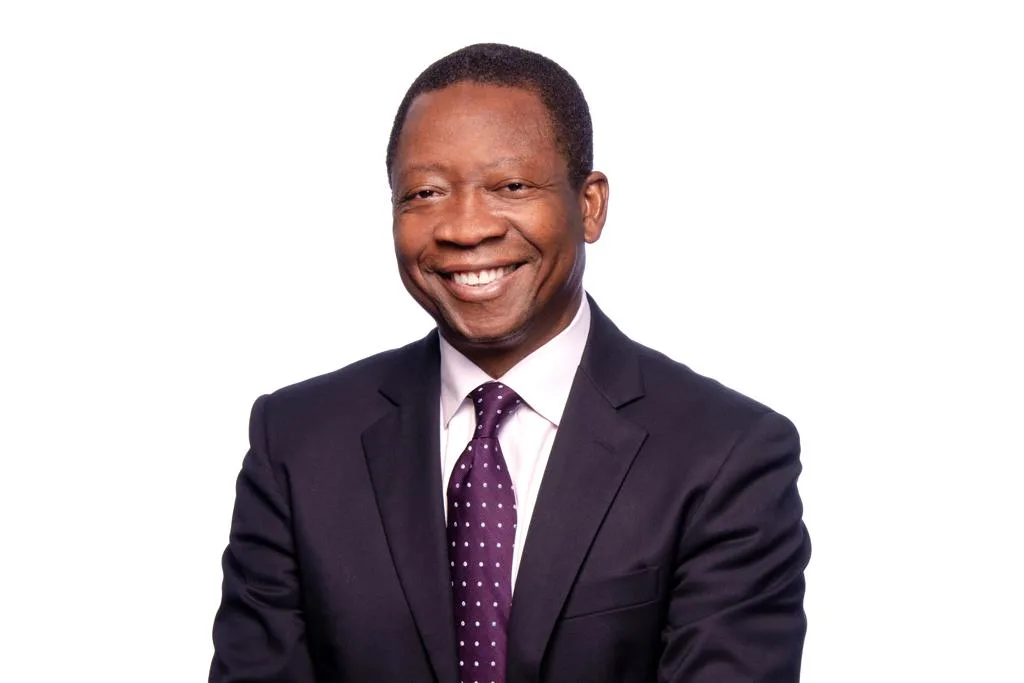
Victor Petenkemani, Wharton MBA (’08)
The 22nd Century belongs to Africa, as the experts say! This rings true for me and Victor Petenkemani, 2008 Wharton/Lauder Alumni, when we connected in July. Victor co-founded the Pan-African Higher Education Initiative Foundation (PAHEi) in 2020 and also serves as the Associate Dean – School of Business at Mercy College in New York.
Throughout my journey, I’ve met many alumni who are keen on making an impact across Africa, but Victor Petenkemani’s story is quite special. Before I went to business school, I worked at Delta Air Lines serving as the pricing analyst for Ghana and Nigeria. I met Victor at a Lauder networking event in 2021 and realized that he worked at Delta years before me. Little did I know, Victor paved the way for Delta to consider flying to Africa! Victor’s life has been divinely orchestrated and his hope, resilience, and passion for quality education is a guiding light for the continent.
Victor is an engaged alumnus that volunteers to support student recruitment at the University of Pennsylvania, including undergraduates and Wharton/Lauder MBA/MA candidates. He attends panels for the annual Africa business focused conferences, The Wharton Africa Business Forum, and the Africa Futures Symposium. His service within the alumni ecosystem reflects his commitment to community, education, and impact in Africa. Victor’s pivot from finance to education has given him momentum to advise deal flow and stay close to the investment community across multiple countries as he serves at Mercy college and embraces fatherhood. Here are Victor’s thoughts on the future of education.
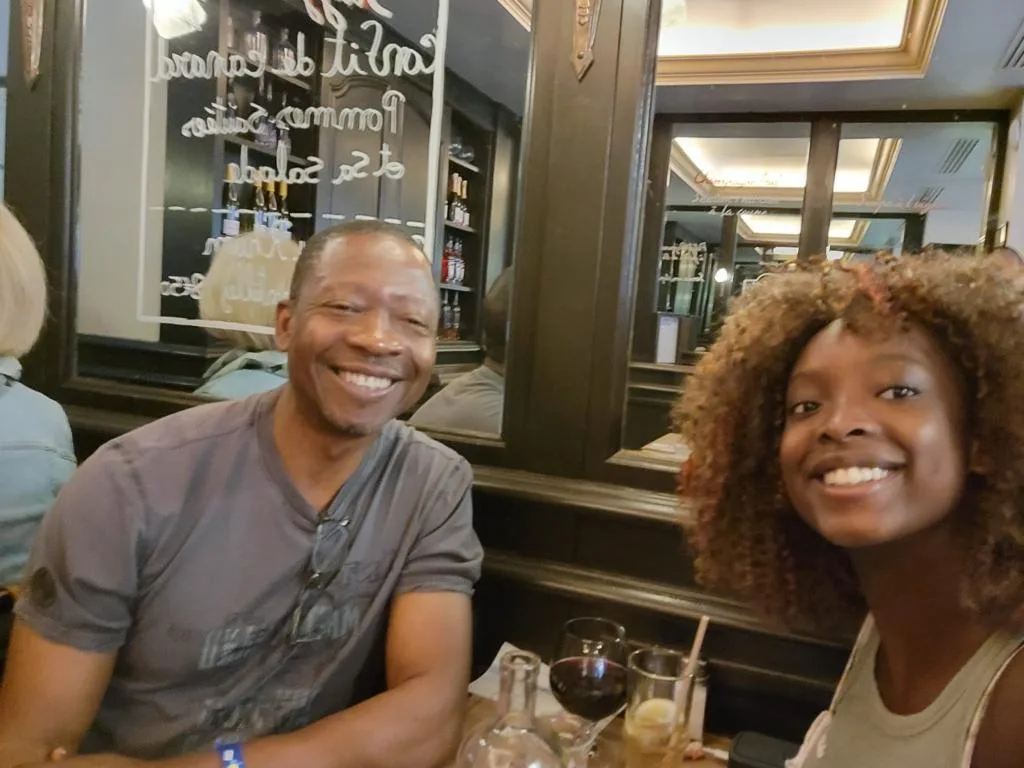
Victor and his daughter, Hannah, exploring restaurants together
AN: Start by sharing your family life, upbringing, and global background personally/professionally as you worked in finance and network planning at Delta?
VP: “I was born and raised in Cameroon, Africa with 14 siblings. Learning to compete started at home for me, with my siblings enabling me to become who I am today. We were a caring and competitive household, whereby success is rooted in our family values and upbringing. My parents were successful entrepreneurs and industrialists and when I lost my father at 16, our family experienced difficult moments. We transitioned from wealth to having compromised resources, and I remember days of not having running water. This was a wake-up call for me. Consequently, my conservative upbringing led me to be resilient.
I jumped at the opportunity to study in France and lived here for almost 10 years pursuing a bachelor’s in economics and a master’s in accounting and finance. I worked for the largest financial institution in France and lived a very comfortable life, yet I was excited about the possible adventures waiting me in the U.S. after I visited. Most of my life had been in a francophone world, and my English was at the novice level, but I enjoyed interacting with Americans. I decided to move to Atlanta, Georgia in 1999 without a plan. I survived by working as a security guard, washing dishes in a hotel, and taking odd jobs to support myself while the visa paperwork finalized.
I began a new career at Delta Air Lines in January 2001 in accounting and rose quickly to support other areas of the business in finance and network planning. I always knew I wanted to make an impact across Africa and the network planning team makes strategic decisions on where to deploy the planes globally. I worked alongside very smart and talented people, and my role supported the restructuring of the Atlanta hub model following the September 11 tragedy. It was a challenging time for the aviation industry, but I began planting a seed and wrote a memo to senior leaders that Africa was a missing destination in the network. My communication was compelling and became a catalyst for leaders to consider new routes to Africa.”
AN: Victor, it’s inspiring to hear that you chased your dreams to the U.S. and worked odd jobs until your visa was approved. Tell us what you were chasing when you pursued your MBA at Wharton/Lauder?
VP: “I was led by my family’s idea of success and making money and, as I reflected on my professional experiences in France where I settled futures contracts on the exchange floor, I had a vision to become an investment banker. However, I did not know ANYTHING about this job, so I applied to Wharton to pursue investment banking, since Wharton is the finance school. I admittedly followed the herd mentality at Wharton, where everyone wanted to pursue consulting or investment banking. The bigger picture for me was to blend my passion for both finance and Africa, so I joined the Wharton Africa Student Association (WASA) and joined the African American MBA Association (AAMBAA) for this supportive community. This was important for me because I became a father during my first year and my daughter Hannah was born in the summer of 2007.
During my second year, I served as co-chair of the Wharton Africa Business Forum, welcoming 600+ conference participants from all over the world. Wharton taught me to lead my peers, who respected my vision and passion for business development across Africa. The Lauder community was a HUGE part of my transformational experience. Visiting Argentina and Mexico for the first time opened my eyes to another layer of the Africa diaspora. I became cognizant of societal challenges to accept Black culture across Latin America. I was fascinated to absorb the Black experience that stemmed from large immigration dynamics within these countries. While the experience was vastly different, it resonated with me, given my background and I researched this community for my Lauder graduation paper.
Upon graduation, I accepted a role in investment banking, knowing that I had to provide for my family. However, I was aware that I was not a good fit for the industry. I appreciated my amazing two-year learning experience because I was well-trained, and investment banking was a steppingstone towards pursuing entrepreneurship and education.”
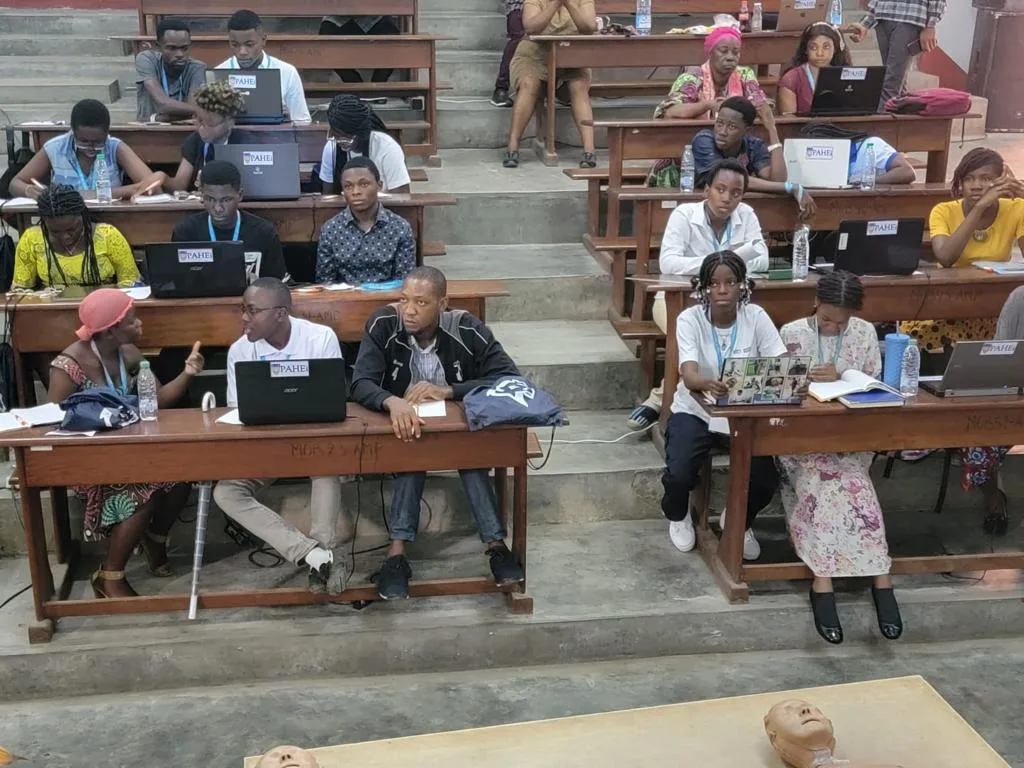
High school students in Yaoundé, Cameroon learning in the PAHEi Summer Bridge Program
AN: Victor, you became an economics professor following your exit from investment banking and eventually started the Pan African Higher Education Initiative (PAHEi). Give us more insight into your vision.
VP: “A greater sense of purpose convinced me to start an entrepreneurial venture after my tenure in investment banking. I began to advise investment companies on deal flow across Africa for a few years before the opportunity to work as an adjunct professor teaching economics, finance, and international business. Interesting enough, while I worked in banking, I served as an adjunct professor. I’m not sure how I managed teaching, working in banking, and tending to my family – but this all happened! I was offered a full-time teaching opportunity in 2015 and became a professor and the Associate Dean – School of Business. I am impact-oriented and Mercy is the largest minority serving institution in New York, and this institution delivers 600+ degrees annually with 40% of students being Latinx, 25% are Black – and 70% are women! I have embraced business and made it impactful, since we are driven by self-interests, to the purpose of doing good.
I am passionate about reducing educational barriers across Africa and my role as an associate dean helps me fulfill my purpose. I’ve learned from Mercy’s amazing mission-driven commitment to educating the underserved and co-founded the Pan-African Higher Education Initiative Foundation (PAHEi) along with people who share my passion of transformational change through better access to quality and affordable education in Africa. My team and I have started building the infrastructure piloting a model that brings US-based faculty and professionals to teach in Africa across thematic curricula. Our biggest challenge is time and resources. COVID-19 delayed this initiative, but in 2021, we had a successful launch, offering a week-long summer program (the PAHEi Summer Bridge program) to 76 students in Cameroon under the theme: The Application of STEM Concepts to Business Decisions. Having a methodical and cadenced approach is intentional to having long-term impact, so I realize it’s best not to move too quickly and to steward limited capital effectively. I hope more exposure to the initiative will attract more philanthropists that are passionate about education across Africa.
Demographically, Africa is on track to becoming the youngest continent by 2050, and PAHEi is a solution to preparing for the population shift, which entails significant economic and geopolitical changes. Delivering American education across borders is not easy because accessing quality education is challenging and cost-prohibitive even for Americans. Yet, we are growing. This year, the PAHEi summer immersion program educated 100+ students focused on a health care curriculum, as this is a critical priority in Africa. Our faculty are involved on a volunteer basis, with twelve of them who traveled to Cameroon to teach this summer, including six healthcare professionals and four nurses. The program engaged 11th and 12th grade high school students on health care basics, such as CPR, maternal health, and provided foundational knowledge of the healthcare industry from a business perspective. The long-term vision for the initiative is to create an American university system in Africa, whereby American style education can be delivered using a hybrid model.
The PAHEi summer immersion program is therefore a window towards our approach to delivering a hybrid American education in Africa. Educators will fly to Africa to instruct in-person and engage students online once the curriculum is established. Asynchronous education can be effective for the transfer of global knowledge, provided that it is well planned and includes in-person components. Developing the youths’ soft skills will therefore require intensive in-person engagements from local faculty and scholars from the US, Europe and Asia who travel for short periods of time. Such skill sets can be built on campus, where students can interact with other students and faculty, and validate each other within their technical and social acumen to be successful. This will enable our program to compete globally and ensure students can effectively enter the workforce or pursue their own ventures at the same level as their peers worldwide. We also believe that faculty on both sides of the Atlantic will be equally transformed by their experiences, seeing an evolved view of societal systems in Africa and the excellent caliber of students who are hungry for knowledge. Our educational structure is a virtuous cycle for self-improvement to fulfill one’s own passion and potential.”
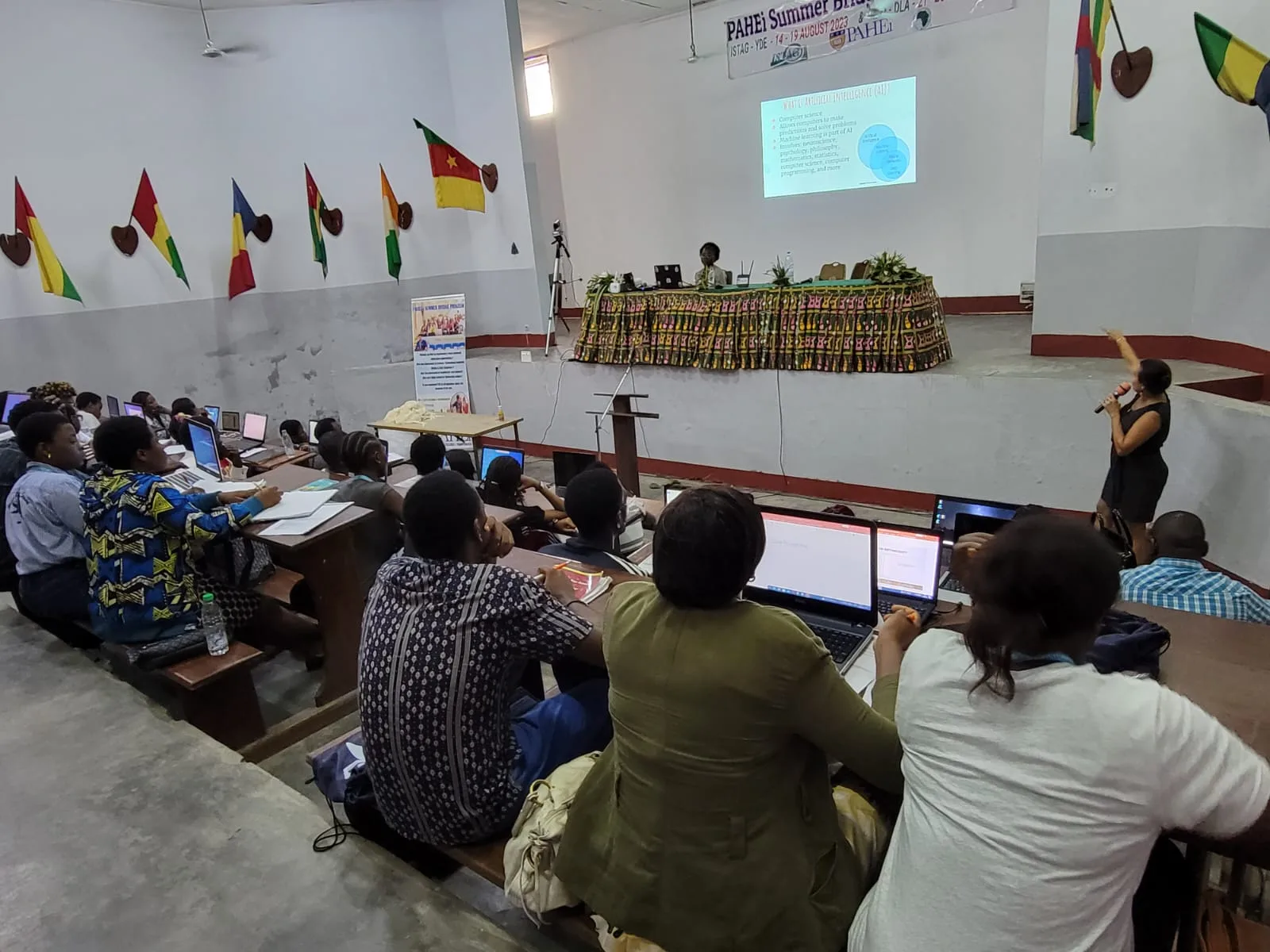
Mercy College Faculty leading a presentation for students in Yaoundé
AN: What is next for you?
VP: “One step at a time. Grow PAHEi into fulfilling the vision. then who knows! I am confident that I will continue working at the intersection of academia and business because this is a powerful platform to prioritize global business for the good of others. Being mission-driven and impact-oriented, I want to continue expanding access to American education to those who are most vulnerable, because I believe that despite the challenge of affordability, it is the best catalyst to upward mobility. The outcome is exponential because the community benefits in tandem from the knowledge that students acquire from the program.”
AN: What advice is essential for MBA students that are facing a tough job market? How would you encourage them to pursue their passions and be authentic to their purpose?
VP: “It is the same advice that I give my daughter Hannah, who will soon go to college. She is bright with a strong personality, and it’s my duty to keep her on the right path, and I want her to be happy and successful.
Students should be truthful to themselves, follow their passions, respect others, and be good listeners. The world is competitive, meaning that nothing will be handed to you! People must be unapologetic about building the skill set and credentials to compete and go after their goals. Remain hopeful to move forward in your journey because success is not a straight road, and you will turn the corner to realize failure is inevitable. Finally, always reflect on the learnings from your journey because these will define who you are in the future and embracing failure is a beautiful way to be resilient and develop strong character values in the face of building your dreams!”
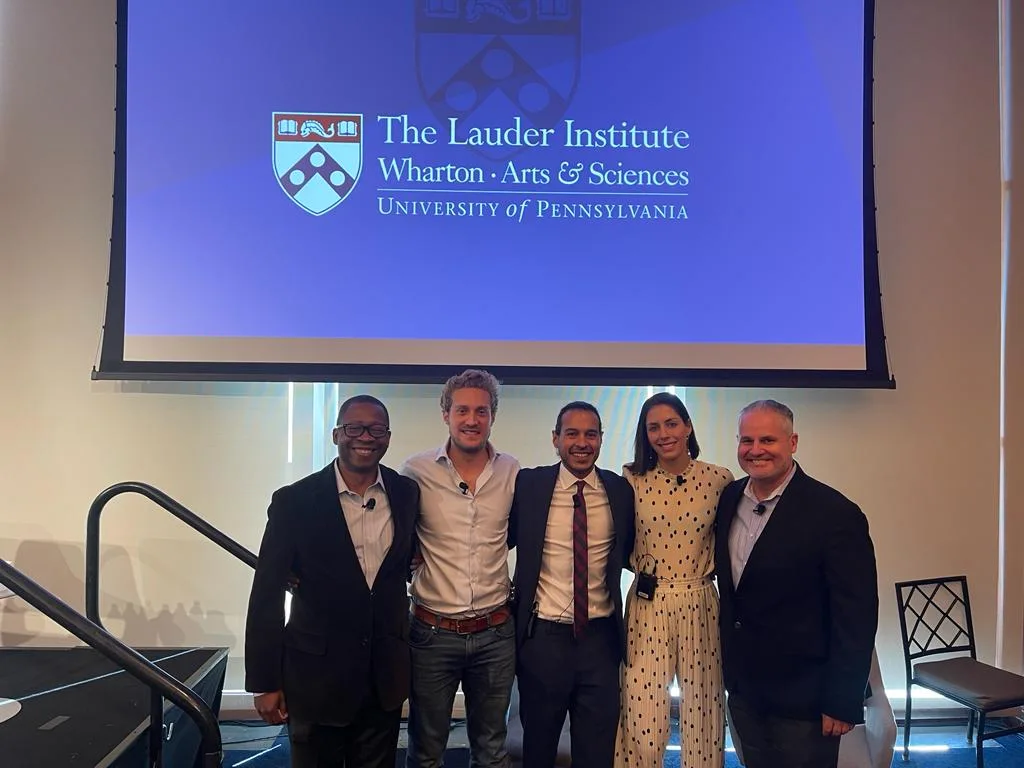
Lauder Alumni left to right at the 2022 LGAW event: Victor, Mauricio Cordero, Sebastian Apud, Stephanie von Staa Toledo, Keith Kohler
AN: “Victor, it has been incredible and rewarding to highlight your profession journey from Cameroon and France to the United States, as you found purpose. I am inspired by your resilience in planting seeds at Delta, where you challenged the status quo to influence commercial flights to Africa. You developed business acumen on Wall Street and remained true to your family values by creating an entrepreneurial venture focused on education in Africa. You started with one goal at a time, made intentional steps, and each experience provided the next step towards making a global impact.
Victor, thank you for paving the way for others to study business development in Africa during business school. I have been transformed by my experiences in Africa and I look forward to supporting the Pan African Higher Education Initiative. This program will change lives through education and serve as a connector for America and Africa to further globalize business education.”
Azline is a Waterloo, IA native and a National Gates Millennium Scholar. She earned a B.A. in International Studies and French at Spelman College. She has visited 47 countries, having lived in Geneva, Switzerland, and interned in Dakar, Senegal and Accra, Ghana. Azline worked for Delta Air Lines for seven years before earning her MBA in Finance from The Wharton School and her M.A. in French African Studies from the Lauder Institute. She currently works at Vanguard in Philadelphia.
DON’T MISS:
Alumni Thriving on Locust: Lauder Global Alumni Weekend
Living On Locust: The Value of Wharton’s Lauder Institute & Dual Degree Programs


Comments or questions about this article? Email us.